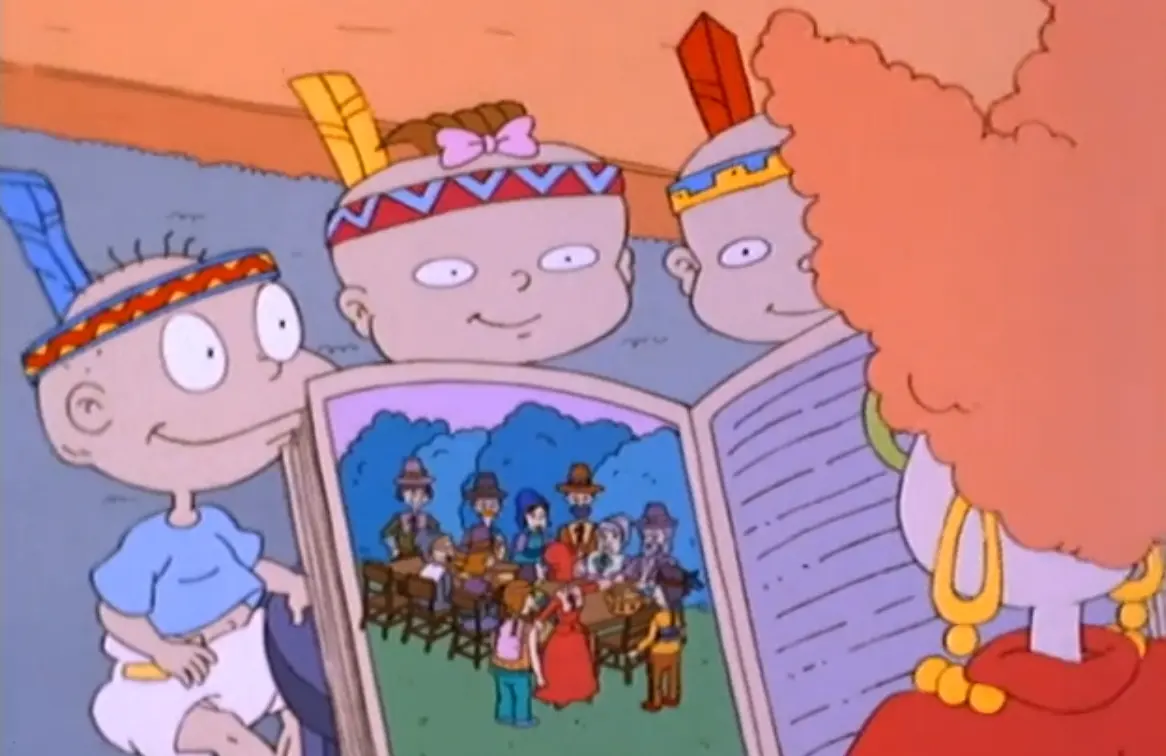Thanksgivings Past: What Rugrats Taught Me About Thanksgiving
-
 A screenshot from the "The Turkey Who Came to Dinner" episode ofRugrats. (Nickelodeon)
A screenshot from the "The Turkey Who Came to Dinner" episode ofRugrats. (Nickelodeon)Thanksgiving episodes are a tradition dating back to television's earliest days. This week on Primetimer, we're traveling back in time to revisit episodes that made an impression on our contributors, both good and bad.
Rugrats: "The Turkey Who Came to Dinner"
Air Date: November 7, 2007
Available to Stream? Yes! On Hulu, YouTube and DailymotionFull disclosure: I initially pitched this piece as a sweet reflection on a Thanksgiving episode I loved very much as a kid. "The Turkey Who Came to Dinner." Rugrats' 1997 holiday episode was a perennial favorite in my household growing up. It was released on a VHS compilation called "A Rugrats Thanksgiving" before it was broadcast on Nickelodeon, and that orange VHS tape was all but worn out by the time I grew out of watching Rugrats.
What I remembered of the episode could be distilled into a couple of flashes: baby ringleader Tommy and his pals befriends a live turkey. Betty DeVille, feminist power mom to tykes Phil and Lil, fights for the last turkey in a supermarket on Thanksgiving. Dads Stu and Drew Pickles, and Chuckie's single father Chaz Finster, set up an overly elaborate set of TVs to watch football. And self-styled princess Angelica makes the babies participate in her own facsimile of the Macy's Thanksgiving Day Parade.
Most of these plots points were my first exposure to a number of Thanksgiving traditions, and Rugrats is the likely reason I still want to watch at least part of the Macy's parade every year, or think of football and Thanksgiving as inextricably linked. Rewatching the episode, none of that has changed.
But a part of the episode I had relegated to just a minor detail in my mind is far more prominent upon re-watching it. Sure, I remembered Tommy and his friends wearing feathers and calling themselves "Nakey Americans" — a cute, babyish misunderstanding of "Native Americans." That was probably the first time I heard the term "Native Americans" used instead of "Indians," actually. (Texas schooling wasn't the best on this subject in my youth.)
What I failed to remember is that Rugrats wildly reframes the story of European colonization into one of friendship between the babies' ancestors and Native Americans. In fact, the story is used to explain the moral of the entire episode: Thanksgiving isn't about fighting, it's about friendship and family, wioth the Pickles, DeVilles, and Finsters cominf together to celebrate their connections in the same way the Europeans and Native Americans did — at least, in the Rugrats universe.
Now, I get that a children's show isn't necessarily designed to properly reflect the brutality of European colonization. I also understand that 1997 is not 2019. But rewatching the episode on Hulu, where it now streams, I find it hard to square the memory I have of the episode with what it actually is. What does it mean that I learned most of what I knew as a child about Thanksgiving from this episode, and why did I fail to remember its ugliest parts?
Thinking back on it, I had pretty warped idea of the relationship between European colonizers and Native Americans for some time. Part of that was this episode, and part of it was insufficient education when I was a kid. Tempering the truth for a young audience doesn't mean revising a story of hostile takeover to be a sweet one of friendship.
Is it particularly noteworthy or novel that a children’s show from the ‘90s told a sanitized version of the Thanksgiving story? Not really, which is why I’m somewhat disarmed at how surprising rewatching this episode was. I knew in theory that kids’ shows weren’t great at tackling complicated interpretations of history, but to find out that Rugrats failed in that regard? That the show I watched nearly every day as a kid led me astray in some way? That a show that could be so compassionate, so kind, and so well-written wasn’t perfect all the time? Yeah, it throws me.
It’s a common experience to revisit something from your childhood and see that it doesn’t hold up. BuzzFeed has practically made a cottage industry out of reexamining "actually pretty messed up" classic movie moments. But our need for nostalgia sometimes protects us from those disappointing memories. We remember the parts that made us laugh, that taught us something good, that felt enjoyable to watch. And we discard that which we have unlearned, no longer compatible with the sweet memories we keep. It's a way of preserving the good, which is not an ignoble goal. But ultimately it's also irresponsible: We should remember where our beloved childhood favorites failed so we can do better in the future.
I'll probably never watch "The Turkey Who Came to Dinner" again, largely because I'm an adult who shouldn't be watching Rugrats with any level of routine. But I'm glad I revisited it. I feel more comfortable remembering it for what it actually was, and thinking of what I would want it to be now.
Kevin O'Keeffe is a writer, host, and RuPaul's Drag Race herstorian living in Los Angeles.
TOPICS: Rugrats, Nickelodeon, Kids TV, Thanksgiving
- Paramount+'s Latest Purge Signals a Troubling Future for Kids' Shows
- Eight Classic Hanukkah TV Episodes (And Where You Can Watch Them)
- Paramount+ renews Rugrats revival for Season 2
- Nicktoons turns 30: How the animated Nickelodeon kids' block captured the early 1990s adolescent zeitgeist by outmaneuvering Disney